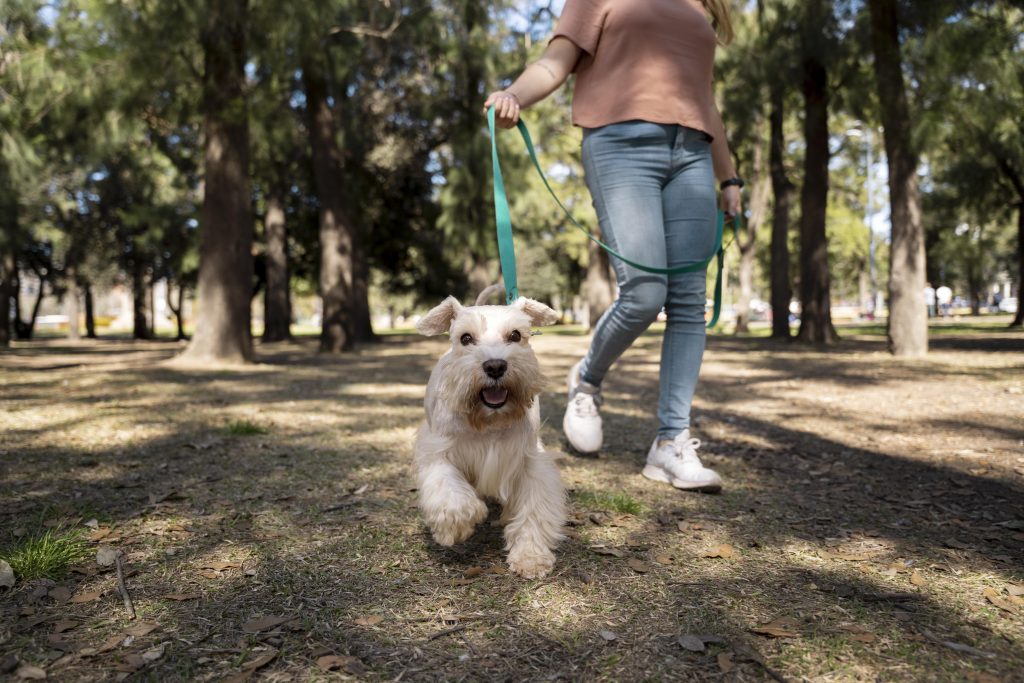Professional dog walking services are a great option for pet owners who lead busy lives, ensuring their canine companions receive the exercise, stimulation, and attention they need. Far more than just a quick walk around the block, a professional service offers numerous benefits for your dog’s physical and mental health.

Why professional dog walking is important
Regular exercise is crucial for a dog’s well-being. A professional dog walker ensures your dog gets the physical activity they need, which helps prevent obesity and related health issues. Equally important, these walks provide mental stimulation, allowing your dog to explore new scents and sights. For dogs that spend a lot of time alone, a midday walk can break up the monotony, reducing the chance of boredom-related behaviors like chewing, barking, or digging.
What’s included in a dog walking service
A professional dog walking service typically offers a structured visit with a variety of activities. A standard service includes:
- A Walk: The length and pace of the walk are tailored to your dog’s needs, whether they are a high-energy puppy or a senior dog.
- Potty Break: This is a crucial part of the walk, as it helps maintain a consistent house-training schedule.
- Fresh Water and Food: The walker will ensure your dog has fresh water and can feed them if a meal is scheduled.
- Basic Playtime: Many walkers include a few minutes of playtime, such as fetch or tug-of-war, to provide additional mental and physical stimulation.
- Note: Many services also provide a written or digital report after each walk, detailing the route, potty breaks, and any notable observations about your dog’s behavior.
Health & behavioral benefits for dogs
- Improved Physical Health: Regular exercise is essential for maintaining a healthy weight and strong muscles, which reduces the risk of joint problems and other health complications.
- Reduced Behavioral Issues: A tired dog is a well-behaved dog. Consistent walks can help minimize destructive behaviors that stem from pent-up energy, such as chewing furniture or excessive barking.
- Socialization: Group walks, if offered, can provide a great opportunity for your dog to socialize with other dogs and learn how to interact appropriately.
- Mental Stimulation: Exploring new environments and encountering different smells keeps a dog’s mind engaged and prevents boredom.
How often should dogs be walked?
The ideal frequency and duration of walks depend on your dog’s age, breed, and energy level. A general guideline is:
- Puppies: Need frequent, short walks (10-15 minutes) several times a day to help with house-training and to build stamina.
- Adult Dogs: Most adult dogs benefit from at least two walks a day, with a total duration of 30-60 minutes or more, depending on the breed. High-energy breeds like Border Collies or German Shepherds may require more.
- Senior Dogs: They still need exercise, but at a slower, more comfortable pace. Several shorter walks a day are often better than one long one.
Choosing the right dog walking service near you
When selecting a service, consider the following:
- Experience and Reputation: Look for a service with a solid reputation, positive reviews, and certified or experienced walkers.
- Safety Protocols: Ask about their safety measures, such as what they do in case of an emergency, and how they handle dogs of different sizes and temperaments.
- Insurance and Bonding: A reputable service will be insured and bonded to protect you and your pet in case of any incidents.
- Compatibility: Schedule a meet-and-greet with the walker to ensure they are a good fit for your dog’s personality.



